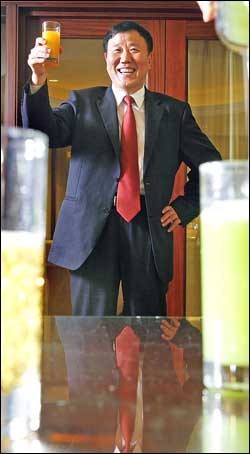(Ecns.cn)--Zhu Xinli, the 59-year-old founder and chairman of Huiyuan Juice Group, China's largest juice maker, has developed a new business plan for organic agriculture, harkening back to his early years as a farmer, revealed sina.com on Tuesday.
In late 2010, Zhu took charge of a new project in a valley in Miyun, to the northeast of Beijing. With 400 mu (66 acres) of organic peaches, 300 mu (49 acres) of organic apricot and plum trees, 30 mu (5 acres) of organic peppers, 20 mu (3 acres) of organic strawberries and more, Zhu plans to create a "second Huiyuan" on this 15,000 mu (2,471 acres) tract of land.
Already in charge of the leading business in the fruit juice industry, Huiyuan's boss now has a new goal: to become a giant in the organic farming world, according to chinadialogue.net.
"Currently, due to overproduction, various commodities are piled up in the market. You have to find an uncontested market space, or a "Blue Ocean," to notch up successes, and your products should be unique," Zhu said in an interview with New Champions magazine.
Based on this idea, Huiyuan established the "organic park" in Miyun to protect the vegetables from getting contaminated by pollutants like pesticides.
The fields where the park is built had been laid aside and ignored by local farmers for years, which qualified them for growing organic food. "The lands are 100 percent clean," confirmed a park manager.
Similar parks could be set up in various wildlands across the country, pointed out New Champions, adding that the model would not only reclaim wastelands but also create jobs for local farmers and help them increase income.
"Huiyuan is still acquiring land for its organic empire. The juice only accounts for part of its business," said Wang Shiping, a researcher at the Institute of Agricultural Economics and Development of the Chinese Academy of Agricultural Sciences.
"In three to five years, there will be another 'Huiyuan' in organic agriculture," noted Zhu, who is now devoting about 70 percent of his energy to organic projects.
Yet, despite a promising future, Zhu still needs to blaze a way forward through various difficulties, since returns on investments in agricultural projects are less likely to come back in a short period. But Zhu estimates that the total investment would eventually amount to 3-5 billion yuan.
Moreover, organic parks are harder to take care of than orchards, said a manager, adding that experience plays a vital role.
"Humidity and temperature vary according to different environments. It all depends on experience to decide when to ventilate the greenhouses and when to spray pesticides," the manager noted.
Companies engaged in organic agriculture also have to be honest and build a credible brand. "Food safety should be a primary concern," Zhu has stressed.
Huiyuan has established a long-term partnership with agricultural experts at China Agricultural University, the country's top academic authority in agriculture.
Supported by government departments like the Ministry of Agriculture, Huiyuan is also considering transferring management of organic parks to local governments, leaving farmers responsible for cultivating the vegetables. Huiyuan would only provide materials, supervision and technical support.
To promote organic agriculture, local governments and farmers are key participators. Government officials and Party members should take the lead and inspire the masses at the same time, analyzed New Champion.
"Development of organic agriculture needs active cooperation from the farmers and strong support from the governments," added a manager of Huiyuan.
With a down-to-earth management style and humble roots, Zhu seems confident in his organic empire. "I can work for at least another 15 years," he said.
Now considered one of China's most successful founders of a private enterprise, Zhu has developed a passion for agriculture, rural areas and farmers over a period of many years.
"I was born to a farmer's family in a small village, and am very familiar with China's rural areas and agriculture," pointed out Zhu, who, growing up with five brothers in Shandong Province, sometimes found himself without enough food to eat.
He eventually entered a career in the local county government, most recently working as deputy director of the foreign economic and trade department.
In 1992 Zhu made the tough decision to leave the stability and comfort of his government position to take over a nearly bankrupt juice-can manufacturer.
It was not easy to give up the "iron rice bowl," reported The Standard, a Hong Kong-based English newspaper. His friends and family warned him not to make the jump, but Zhu says he did not want to regret passing up the chance of a lifetime.
"I didn't know anything about the juice industry when I started," Zhu told the newspaper in 2008. "All I had was a gut feeling that this is what I had to do."
Zhu made a late start in his business career; he was 40 when he decided risk going out on his own. Armed with a bank loan, Zhu bought equipment from Germany and started out building the firm into China's largest juice company.
In September 2008, U.S. drink giant Coca-Cola tried to acquire Huiyuan for HK$17.92 billion ($2.3 billion), and would invest more than $2 billion over the next three years in China to build new bottling plants and distribution infrastructure. But the bid failed to meet the country's anti-monopoly law, according to the Xinhua News Agency.


















